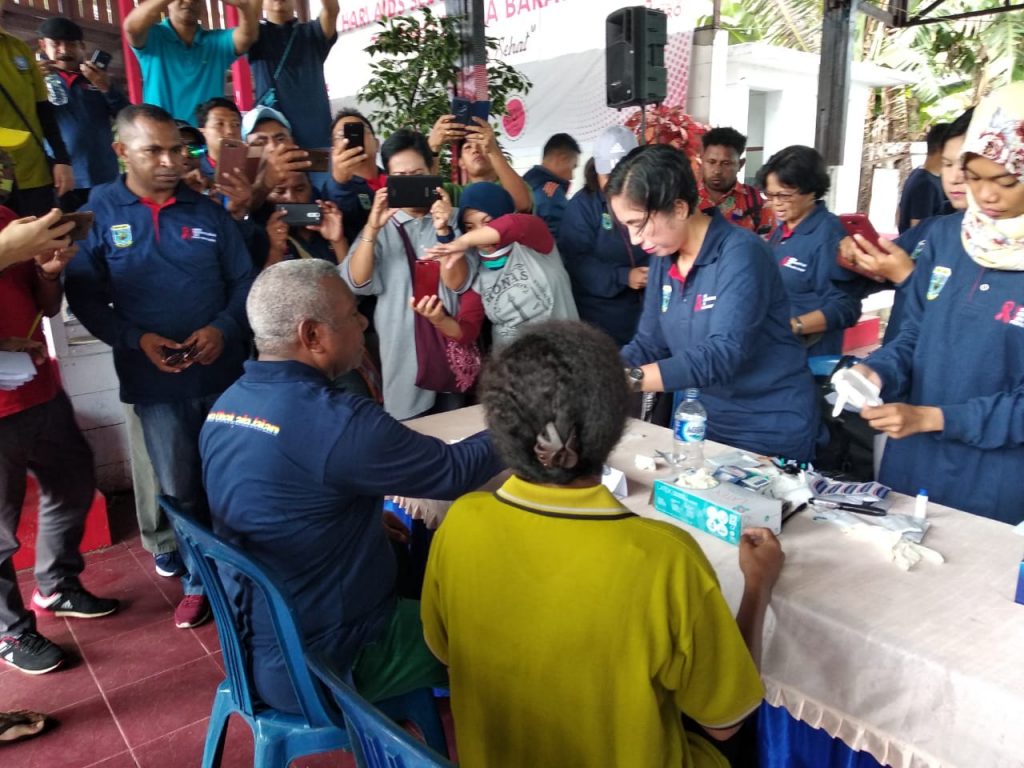Hari Aids Sedunia di Monokwari Papua

HIV is not easily transmitted. HIV is transmitted through risky sex, the use of more than one syringe and blood transfusions. Viruses are also easily transmitted from mother to child, for example through breastfeeding. The assumption and myth of HIV transmission cannot be separated from the stigma that still exists at this time. Those who know better […]
Sekarang anak saya memiliki nafsu makan

Shifa, the name of the 32-month-old girl from Sumur Batu village is the daughter of a health cadre, Mrs. Siti Jubaedah. When ADRA staff first recorded her weight, this little girl’s weight was 10kg and included in the category of malnutrition. The observation did by ADRA in the field, Syifa is indeed difficult to eat […]
Proyek WASH Barus

NORTH BARUS – SIBOLGA. ADRA Indonesia’s WASH North Barus Project, supported by ADRA International successfully accomplished water facilities construction with 415 Water Piping System installed in four villages through 12,948 m piping construction, 2 water collection box constructed, 8 water reservoirs installed, 800 families have better access to improve drinking water. Sanitation: 70% of family […]
Satu komitmen untuk mengakhiri Malnutrisi

The INSTINCT (Improving Nutritional Status of Indigenous Community Toddlers) Project focuses on the under five through posyandu revitalization program involving the roles and integrated strategies of all stakeholders: regency government, DoH, BAPPEDA (Regional Development Planning Agency), and related SKPDs (Regional Government Working Units) together with village officials, including village head, traditional and religious leaders, puskesmas […]
Bangkit untuk Martabat Mereka yang Tertekan

Background Persons with HIV/AIDS are distressed because of the physical fatalities of the disease itself, as well as social stigma caused by lack of understanding and loving attention of their society at large. Papua is the most prevalent area with HIV/AIDS cases in Indonesia. Innovative Solution ADRA Indonesia works to empower the government, religious and […]
Bangkit untuk akses air bersih

Background People of North Barus were also affected by the Asian tsunami last 2004. They are also lack of water because they do not have direct access to the water facility. Women are used to collecting water daily from the nearest water spring in the mountainous part of Central Tapanuli Regency. Innovative Solution The water […]
Program Kesehatan dan Pendidikan Nutrisi (Proyek HANEP)

The high number of malnourished children under the age of five (under-5) is found in Sangihe Talaud District due to the limited knowledge and skills of community health workers, Posyandu volunteers (health cadres) in dealing with the underweight children and assisting the mothers/ caregivers. People need to acquire foods from outside Sangihe Islands, mainly from Manado […]
Bangkit untuk makanan bergizi

Background Under-five children‘s nutritional status indicates community welfare, child survival measures, and reflections on conditions in which children (and others in society) live, including their healthcare. In Sangihe, mothers and caregivers and their under-five children have low attendances in Posyandu (Integrated Services Post) in each village.As the results, the number of the stunted and malnourished […]
Promosi CLTS - Central Lombok, West Nusa Tenggara

The result of WATER Project recently done in the same area, Tumpak village, was analyzed that they need a better environment sanitation to make the healthy habits, and bring a better outlook of the village. One of the uniqueness of Tumpak village was that they defecate in open field, nearby their house. This is […]
Bangkit untuk sanitasi total

Background People of Lombok put their fate in tourism as one of the sectors for economic growth. While Lombok is progressively becoming the second home to visitors, the sanitary condition will tell about their future development. Tumpak village, located on the southern coast of Lombok Island, needs to be open defecation free (ODF) area to […]

